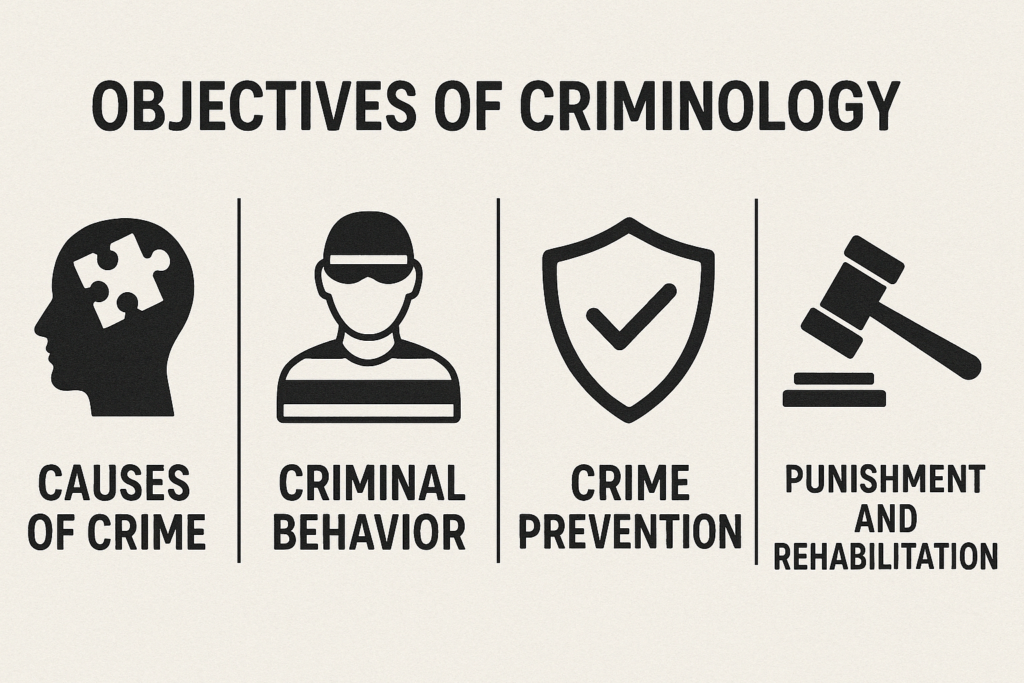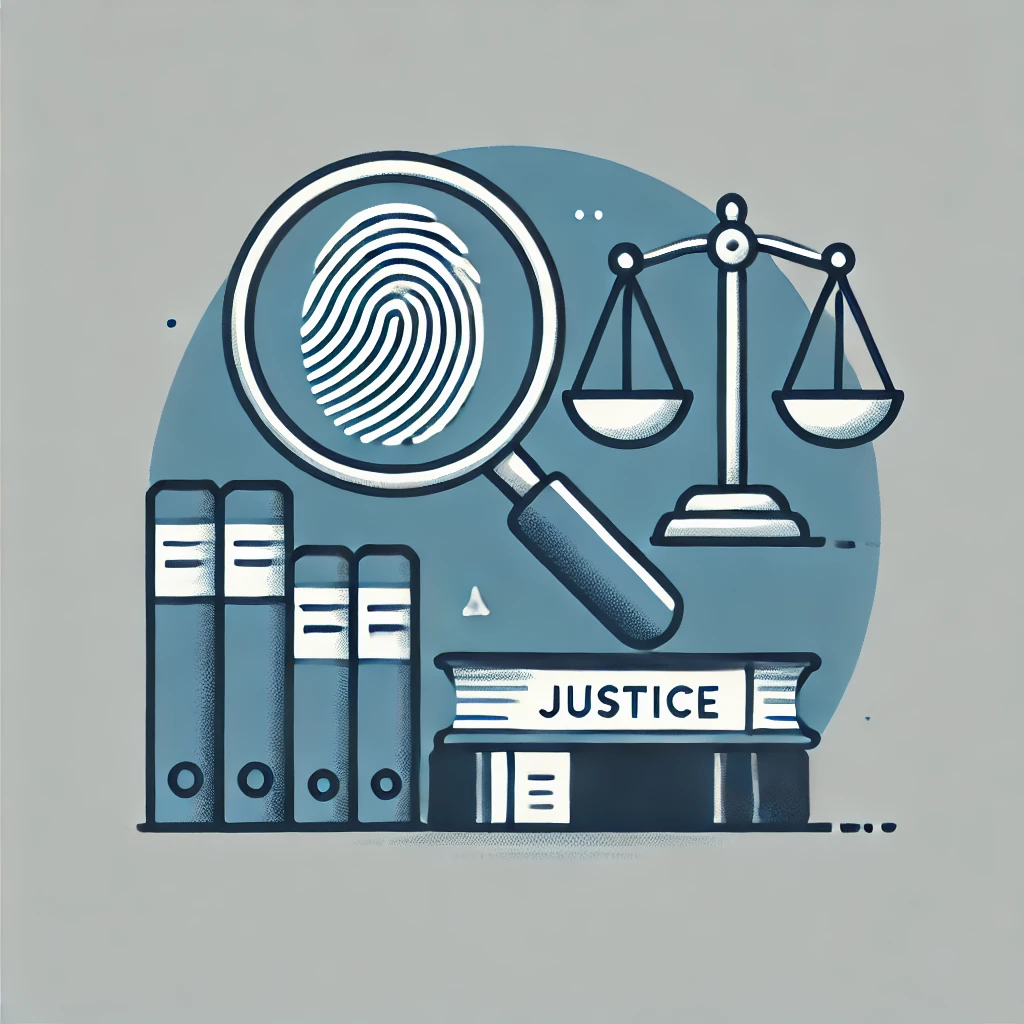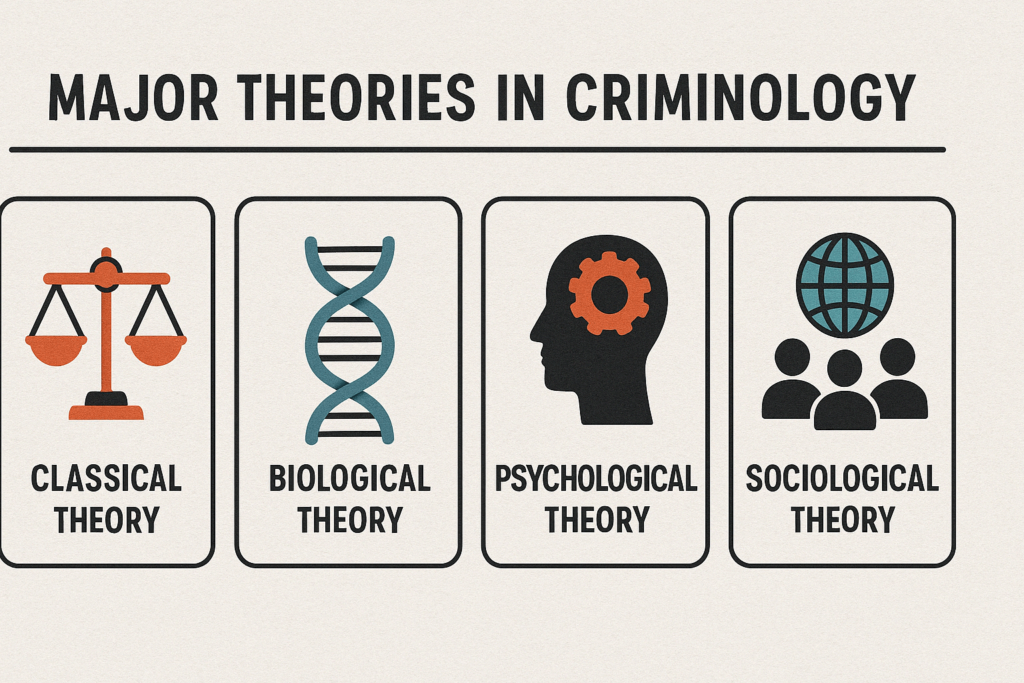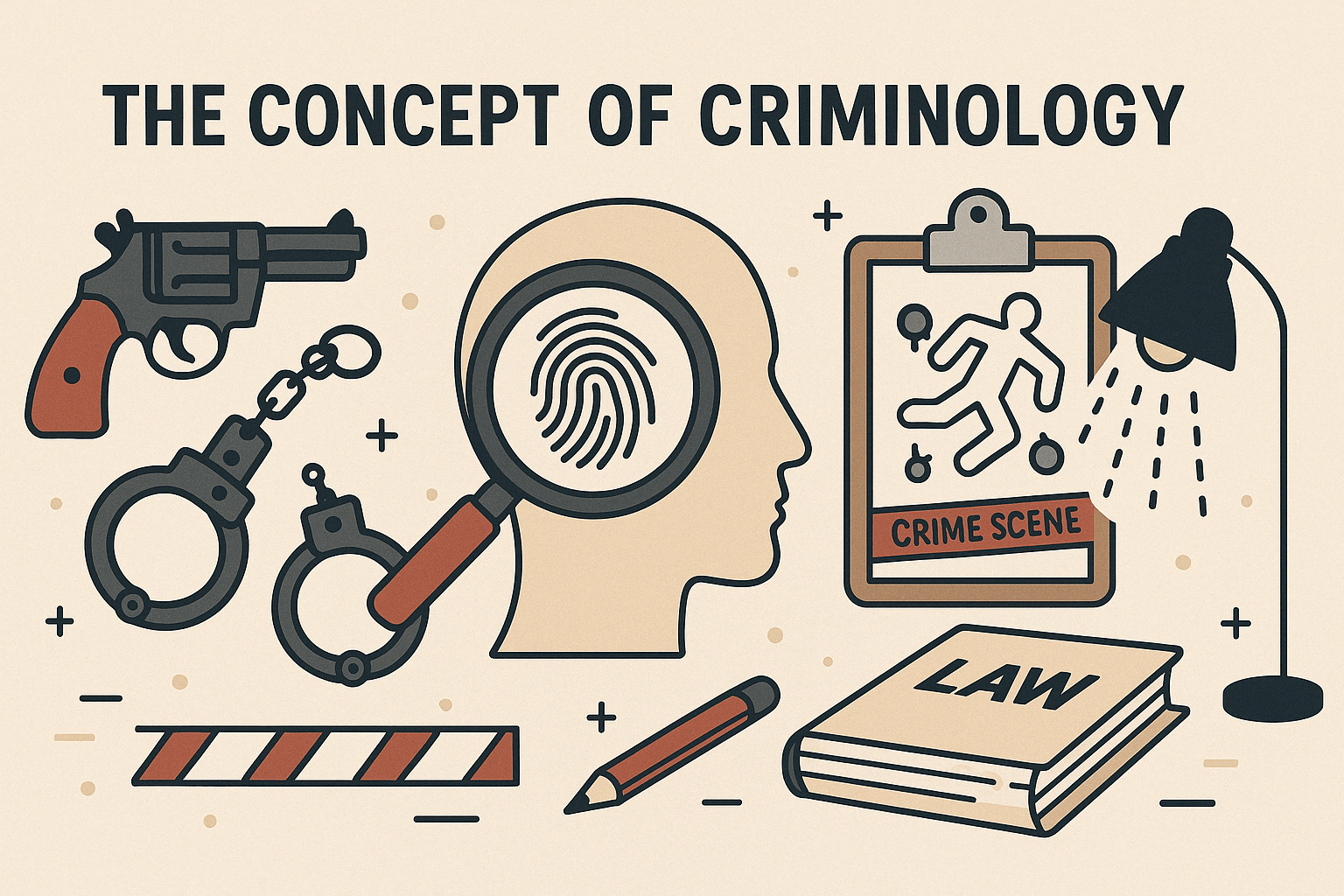. Introduction to Criminology
Criminology is a relatively modern social science focused on studying crime as a complex, multi-dimensional human behavior. This science aims to analyze the actions of individuals and institutions that lead to crime, understand the factors shaping criminal behavior, and develop strategies to address and prevent crime in the future.
Criminology goes beyond studying offenders; it also examines societal reactions, the effects of crime on victims, and on society as a whole. It serves as a vital tool for understanding various criminal patterns and methods to reduce them, while also guiding criminal justice policies and enhancing the effectiveness and fairness of criminal justice institutions.
Additionally, criminology plays a significant role in providing scientific insights that assist in developing preventive policies aimed at addressing social problems that may contribute to criminal behavior, such as poverty, unemployment, and social isolation. With the increasing complexity of modern crimes, including cybercrime and terrorism, the continuous development of criminological research is essential to meet the changing needs of society.
2. History of Criminology
Criminology emerged as an independent science in the late 19th century, initially based on observations and ideas regarding the causes and nature of crime. In the early stages, there were no scientific methods for studying criminal behavior, and ideas were rooted in philosophy and changing social values. The scientific foundation of criminology was laid by thinkers like Cesare Lombroso, Sigmund Freud, and Émile Durkheim, who helped establish it as a systematic discipline.
- Ancient and Medieval Eras: In ancient times, criminal behavior was often explained as the result of supernatural forces or divine anger. During the Middle Ages, the church viewed crime as a religious deviation, punishing offenders with severe methods such as execution and physical punishment.
- The Enlightenment and the Beginnings of Scientific Inquiry: During the Enlightenment, views on crime became more rational. The Industrial Revolution also played a major role in the development of criminology, as new social and economic challenges emerged.
- Scientific Foundation by Lombroso: Italian criminologist Cesare Lombroso (1835-1909) is considered one of the pioneers of criminology. He proposed a scientific theory based on the idea that some individuals are born with criminal tendencies, reflected in certain physical traits. Although his theory faced criticism later, it inspired scientific research into the biological aspects of crime.
- The 20th Century: The 20th century witnessed significant advancements in criminology, with the integration of biological, psychological, and social perspectives to form a comprehensive understanding of the causes of crime. Interest grew in the psychological and social dimensions of criminal behavior, fueling the need to develop this science to meet the demands of an evolving society.
3. Objectives of Criminology
Criminology aims to achieve various objectives that contribute to reducing crime and promoting social justice. These objectives include:
- Analyzing the Causes of Criminal Behavior: Criminology helps in understanding the factors that lead to crime, such as environmental, psychological, economic, and social factors. This knowledge aids in addressing the root causes of crime instead of merely dealing with its outcomes.
- Studying the Impact of Crime on Individuals and Society: Criminology seeks to study the psychological and social effects of crime on victims and society as a whole, providing necessary support for victims and raising community awareness.
- Developing Crime Prevention Strategies: Through understanding the causes of crime, criminology contributes to developing preventive policies aimed at preventing future crimes by improving social and economic conditions that may lead individuals toward criminal behavior.
- Achieving Social Justice: Criminology guides criminal justice systems to become fairer by providing scientific insights into criminal behaviors, victims’ needs, and ways to deal with offenders through punishment or rehabilitation.

4. Major Theories in Criminology
The following theories are among the most prominent in explaining criminal behavior from various perspectives:
Biological Theory (Cesare Lombroso)
The biological theory is one of the earliest theories in criminology. Lombroso hypothesized that some individuals are born with criminal tendencies due to genetic and physical factors. Although this theory has been criticized for oversimplifying crime, it laid the groundwork for studying biological factors.
Psychological Theories (Sigmund Freud)
Freud‘s psychoanalysis contributed theories on the influence of the unconscious mind on criminal behavior, suggesting that internal conflicts or psychological trauma could lead to criminal tendencies. These ideas have inspired many researchers in forensic psychology.
Sociological Theory (Émile Durkheim)
Durkheim proposed that crime is a natural phenomenon in every society, playing a role in driving social change. He also introduced the concept of “anomie,” where a breakdown in social norms leads to higher crime levels due to the loss of social bonds.
Differential Association Theory (Edwin Sutherland)
This theory argues that criminal behavior is learned through interaction with others who engage in illegal activities. It is one of the most important theories explaining how criminal behavior can be passed down across generations.
Strain Theory (Robert Merton)
Strain theory explains that the societal pressures individuals face due to the gap between their aspirations and the legitimate means available may push some toward crime as a means to achieve their goals.
5. Branches of Criminology
As a multidisciplinary field, criminology includes several branches that focus on specific aspects of criminal behavior. Key branches include:
A. Criminal Psychology
Criminal psychology focuses on studying the psychological aspects of criminals. It analyzes offenders’ personalities, motivations, and the psychological factors leading to criminal behavior. Criminal psychology plays a significant role in helping law enforcement understand repeated offender patterns, providing guidance in investigations, and offering psychological reports on defendants’ accountability.
B. Criminal Sociology
Criminal sociology studies the social factors contributing to crime, such as poverty, education, family, and social environment. This branch seeks to understand how social relationships and the surrounding environment influence criminal behavior and often aids in policy development aimed at improving social conditions to prevent crime.
C. Criminal and Statistical Analysis
Criminal and statistical analysis employs statistical methods to gather and analyze data on crime rates to understand criminal patterns and make predictions. This branch significantly contributes to guiding police policies, identifying high-crime areas, and evaluating the impact of preventive measures on crime rates.
D. Penology and Rehabilitation
This branch focuses on how to handle offenders through punishment and rehabilitation. Penology and rehabilitation aim to provide effective rehabilitation methods to help offenders reintegrate into society after serving their sentences.

6. Tools and Research Methods in Criminology
Criminology relies on various tools and research methods that aid in collecting and analyzing data about criminal behavior. These tools include:
A. Surveys and Questionnaires
Surveys and questionnaires are used to gather information from different social groups regarding their attitudes and experiences with crime. These tools help understand societal attitudes and challenges regarding crime and provide extensive data for statistical analyses to predict crime patterns in specific areas.
B. Interviews and Case Studies
Interviews and case studies are effective tools in criminology, providing deeper insights into criminal behaviors through interviews with offenders, victims, or family members. Case studies analyze individual or group behaviors, revealing patterns and details that may be invisible through statistical analysis alone.
C. Statistical Analysis
Statistical analysis is a key tool in criminology, employing statistical techniques to analyze crime data, such as the geographical distribution of crime, crime frequency, and offender demographics.
D. Big Data Analysis
With technological advancements and the growing volume of data, big data analysis has become an important tool in criminology. Artificial intelligence techniques analyze vast amounts of data to uncover trends and patterns in criminal behavior on a large scale.

7. The Role of Criminology in Law Enforcement
Criminology plays a vital role in supporting law enforcement and judicial institutions by providing research that helps understand criminal behaviors and guide preventive efforts. Key aspects include:
A. Guiding Law Enforcement Agencies
Criminological research provides law enforcement agencies with information about high-crime areas and peak crime times. This research helps direct police operations more efficiently and target potential crime locations based on scientific analyses.
B. Crime Prevention
Criminology contributes to developing preventive strategies aimed at preventing crime before it occurs. This is achieved through studying social and economic factors leading to criminal behavior and recommending programs to improve social awareness and living conditions.
C. Influencing Public Policy
Legislators rely on criminological research when enacting crime and punishment laws. For example, studies have shown that some disciplinary policies can be more effective than others in reducing crime. Therefore, decision-makers benefit from criminologists’ recommendations to establish appropriate policies based on recent research.
8. The Role of Criminology in Education and Rehabilitation
Criminology plays a significant role in directing rehabilitation and re-education institutions. Key contributions include:
A. Rehabilitation
Criminology helps develop effective rehabilitation programs for offenders to correct their behavior and prepare them for reintegration into society. These programs are based on psychological and social studies to understand criminal behavior and provide therapeutic solutions.
B. Social Awareness
Criminology contributes to raising public awareness about the causes of crime and ways to prevent it. Community awareness can reduce crime rates by promoting moral values and increasing understanding of the negative consequences of crime.
C. Providing Psychological and Social Support
Programs offer psychological and social support to offenders post-release to help them adapt to society and prevent recidivism. These programs rely on criminological research to determine the best ways to support offenders and provide them with a conducive environment.
9. Conclusion: Understanding the Role and Impact of Criminology
In summary, criminology is far more than just a theoretical study of crime — it is a powerful and essential discipline that helps us understand the reasons behind criminal behavior, how to prevent it, and how to respond effectively when it occurs. Through its multidisciplinary approach, criminology combines knowledge from sociology, psychology, law, and social policy, offering a broad and balanced perspective on the complexity of crime.
The true importance of criminology lies in its ability to transform raw crime statistics and individual cases into meaningful insights. By studying patterns, root causes, and the social structures that influence criminal actions, criminology equips both researchers and practitioners with the tools to shape safer communities. It pushes beyond punishment, encouraging crime prevention, offender rehabilitation, and social justice as long-term solutions.
As society evolves, so do the challenges we face regarding crime — from traditional offenses to modern cybercrime and global criminal networks. Criminology continues to adapt to these changes, making it a dynamic and highly relevant field. Its role is not only to understand criminal behavior but also to guide policymakers, educators, and law enforcement agencies toward strategies that foster both security and fairness.
Ultimately, criminology reminds us that crime is a social issue shaped by many interconnected factors. Only by understanding these factors can we hope to create effective and ethical responses to criminal behavior, both today and in the future.

